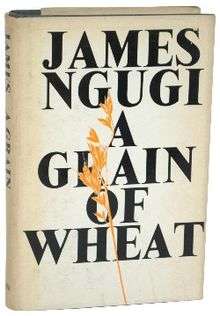A Grain of Wheat
 First edition | |
| Author | Ngũgĩ wa Thiong'o |
|---|---|
| Country | Kenya |
| Language | English |
| Genre | Historical novel |
| Published | 1967 (Heinemann) |
| Media type | Print (Hardback & Paperback) |
| Pages | 247 pp |
A Grain of Wheat is a novel by Kenyan novelist Ngũgĩ wa Thiong'o first published as part of the influential Heinemann African Writers Series. It was written while he was studying at Leeds University[1] and first published in 1967 by Heinemann. The title is taken from the Gospel According to St. John, 12:24. The novel weaves together several stories set during the state of emergency in Kenya's struggle for independence (1952–59), focusing on the quiet Mugo, whose life is ruled by a dark secret. The plot revolves around his home village's preparations for Kenya's independence day celebration, Uhuru day. On that day, former resistance fighters General R and Koinandu plan on publicly executing the traitor who betrayed Kihika (a heroic resistance fighter hailing from the village).
Characters
- Mugo, a loner who became a hero after leading a hunger strike in a British concentration camp and trying to stop a village guard from beating a pregnant woman to death. Although he is thought to be a hero throughout the whole book, he is the traitor who betrayed Kihika to the British in the hope of collecting a reward.
- Gikonyo, an ambitious carpenter and business man married to Mumbi. He confessed to taking the oath of the resistance while in a concentration camp, securing an early release only to find that his wife had borne a child with his hated rival Karanja while he was away.
- Mumbi, the wife of Gikonyo and sister of Kihika. While Gikonyo was imprisoned she slept with Karanja, who had been appointed village chief by the colonial power.
- Karanja, a collaborator with the British and widely suspected to be the traitor.
- Kihika, a resistance fighter who conquered a police station and killed the hated District Officer Robson. He was caught and hanged after being betrayed by Mugo.
- John Thompson, an early British settler and administrator of Thabai, who believes in the ideals of colonial imperialism and persecutes black Africans.
Plot summary
A Grain of Wheat is about the events that lead up to Kenyan independence, or Uhuru. It's set in the background of Mau Mau rebellion. The setting is a Kenyan village. When the characters Gikonyo and Mumbi get married, in love and just starting their lives, Gikonyo is sent to detention. When he comes back after six years, Mumbi had his rival's child. They cannot find the words to talk about the past, and a wall is created between them. Mumbi's brother gets captured and hanged and the town realize that, the one they thought to be the hero, was actually the betrayer.
Reception
For Jonatan Silva, reviewing the book for A Escotilha, A Grain of Wheat is an important portrait of Kenya struggle for independence. "He made a game of mirrors in this novel", wrote Silva.[2]
References
- ↑ "Ngũgĩ wa Thiong'o: A Grain of Wheat" Archived February 11, 2015, at the Wayback Machine., The Modern Novel.
- ↑ http://www.aescotilha.com.br/literatura/ponto-virgula/queniano-estabelece-jogo-de-espelhos-em-romance-politico-e-visceral/
| Wikiquote has quotations related to: A Grain of Wheat |